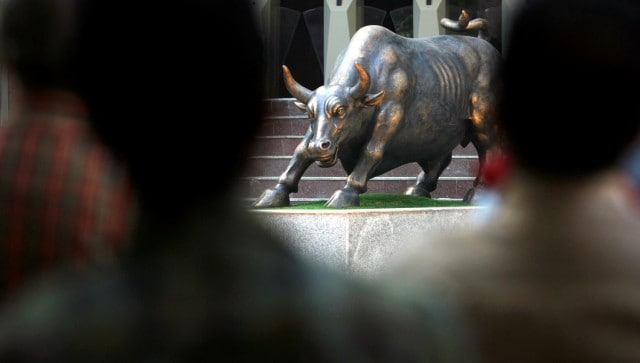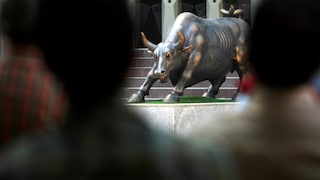

Representational image. Photo: REUTERS
People behave irrationally during a meltdown or a downturn in the economy. Surprisingly, a lot of business owners do not rush to sell their businesses during a downturn, but when the stock markets are declining, we find that a lot of people start selling their stocks of good companies from their portfolios. They approach stocks as pieces of paper rather than proofs of part ownership of the businesses.
Let’s say that a businessman runs a heritage hotel. During normal times, his profit is `1 crore. But as the COVID-19 fear spread, travel was disallowed and restrictions were imposed, businesses did come to a halt for some time. Usually, the businessman would not put his hotel up for sale just because of one year of slow business. However, in the stock market, people exhibit the opposite behaviour. There is a rush to sell portfolio holdings when the market slows down or starts to decline. These are the times when the astute investor uses his common sense and cash to buy businesses at dirt-cheap valuations in the stock market. Such events are common to most businesses. There are hardly any businesses which do not see a decline in their values during a market panic.
To make these points clear, I have selected a few companies which faced a hiccup in their businesses and the market severely punished their stock prices, providing astute investors with great investing opportunities.
IPCA Laboratories is a very successful pharmaceutical company with a current market cap of 27,000 crore. Its main business is API manufacturing and branded formulations for the Indian and international markets. In 2014, the US FDA made certain observations on inspection, which resulted in suspension of API shipments to the USA. The stock market reacted negatively to the news and in a short time, the stock price corrected over 50 per cent. IPCA labs had a great management team and in a brief window of time therafter, they were able to resolve the issues in their manufacturing. Their net profit is now double their 2014 levels. Investors who invested during those 50 per cent declines are now sitting on five times their investments! The intelligent investor waits for such opportunities in stocks and takes full advantage of them.
During 2015, ICICI Bank had peaked its ROE to 15 per cent and compared tofive years previously, had almost tripled its net profit from `4,670 crores in 2010 to `12,247 crores in 2015. However, with the economy slowing down from 2016, the top lender had seen concerns building up on its asset quality to corporate loans resulting in non-performing assets. The market punished the stock price from `321 in January 2015 to `168 in February 2016. This was close to a 48 per cent decrease in its stock price. However, the management was able to ride through the troubles. ICICI Bank also had profitable businesses in the form of ICICI Lombard life insurance, securities and asset management.
The bank was available at its lowest valuation in over a decade. This was the time to buy ICICI Bank stocks. The bank now has a profit of 14,749 crores as of 2021 and its stock price is at a lifetime high of `647. It has turned into a three bagger in a few years! Buying good quality companies when they have been mispriced is the cornerstone of wise investing.
Nestlé India is one of the leading FMCG companies in India with a very high ROE and market-dominating products in many categories. In June 2015, the food safety regulators banned Maggi noodles after finding excessive levels of lead in its samples. Nestlé India had to pull Maggi from the market, causing reduced profits in 2015. The markets beat down the stock from 7,280 to 5,100 levels in February 2016. The courts eventually ruled in favour of Nestlé India and soon, their profitability was back on track. From a low profit of `563 crores in 2015, the profits in 2021 touched almost `2,100 crores. During that period, smart investors who purchased the stock have received at least three times more gains, with the Nestlé India stock touching 18,577 in December 2020! This was an event risk* that unfolded. Sharp investors need to be on the lookout for such events and seize the opportunities they create.
HDFC Life is one of India’s foremost life insurance companies. In February 2018, the government announced the 80C of the Income Tax Act to be optional. All listed life insurance companies started correcting, and HDFC Life came down from being a 500 stock to the 350 range. In reality, their business had never been impacted by the announcement but the investors misjudged the business impact and kept selling the stock over the next few months. The stock fell to attractive levels and that was the perfect opportunity for value investors to buy the share. Those who bought in during that period quickly gained a large appreciation from the stock price.
The bear markets are the moments that value investors wait for. Stocks can keep going down. There is no point trying to catch the bottom. No one is known to be able to achieve that regularly. The investor needs to keep on investing on a monthly or weekly basis once the prices are in a range that they are comfortable with. These are the times when people, in a state of panic, are ready to part with gold nuggets, while the astute investor is ready to gobble them up. There is a point when the markets will stop going down. Once the tide reverses, the upward move is swift. First, the leading companies see their prices recover. After that, the rest of the market sees a broadening of the trend. The midcaps and small caps that have been battered to pulp see a swift recovery.
Intelligent investors do not want to miss these opportunities. George Soros said, ‘The worse a situation becomes, the less it takes to turn it around, and the bigger the upside.’*
It is not intelligence that is required during bull markets but the stomach and heart to stay invested, and during bear markets, to buy stocks. If the investors preserve their presence of mind and have cash for funding, then they can make some excellent purchases during these nervous periods.
Panics are a reflection of mass hysteria. They have been happening for hundreds of years. The psychology of fear remains the same. Accepting them as part of the attributes of capital markets is the first step. Taking advantage of them is quintessential for the value investors.
[Extracted with permission from the author and publisher.]
The author was formerly a banker and is now an entrepreneur running two heritage hotels, Dera Rawatsar and Fort Barli, in Rajasthan. Views expressed in the above piece are personal and solely that of the author. They do not necessarily reflect Firstpost’s views.
Read all the Latest News, Trending News, Cricket News, Bollywood News,
India News and Entertainment News here. Follow us on Facebook, Twitter and Instagram.
Join our Whatsapp channel to get the latest global news updates
Published on: November 26, 2023 18:01:49 IST





